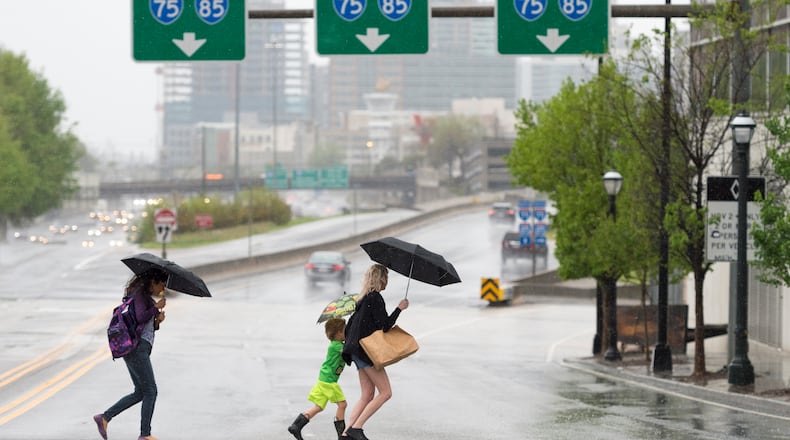Atlanta isn’t home to any icebergs at risk of melting. It’s not on the coast, where rising sea levels can flood communities. And while summers in the city are hot, Atlanta is far from becoming a dry desertscape.
But the impacts of climate change are likely to still put long-term stress on metro Atlanta, scientists, officials and activists said, one day after The New York Times widely publicized a report that predicts rising temperatures nationwide and reduced rainfall in the southeastern United States.
The study was conducted by researchers from 13 federal agencies and concluded that the average U.S. temperature is expected to rise. In the southeast, the report predicts, conditions are getting drier.
“We look at the science; we are aware of the trends that only seem to be worsening when it comes to the impacts of a warming climate,” Stephanie Stuckey, the chief resilience officer for the City of Atlanta, said. “We’re very aware of the drought and the increasing temperatures.”
An overwhelming majority of scientists agree that the climate is changing, and that humans are primarily responsible for global warming.
Even land-locked cities like Atlanta, Stuckey said, will witness the effects of climate change, specifically a water supply that could decrease over the next several years. At the same time, the city is also likely to face population growth as an indirect result of sea level rise, which can force coastal residents to move inward, she said.
The report published in the Times Monday night “rings true to what we’ve seen in previous reports,” said Marshall Shepherd, a meteorologist and the director of the Atmospheric Sciences program at the University of Georgia.
Different parts of the state are vulnerable to climate change in different ways, Shepherd said. Urban areas are more likely to see extreme heat and intense bursts of urban flooding, while southern parts of the state are more susceptible to drought, he said.
Credit: JOHN SPINK / AJC
Credit: JOHN SPINK / AJC
Within the metro area, Stuckey’s team is preparing a climate action strategy, which includes long-term solutions for increasing energy and water efficiency. The city hopes to build a water reservoir, install solar panels on public buildings and partner with the private sector to increase sustainability.
One area already seeing the impacts of climate change is the Chattahoochee River, which creeps across almost the entire state and provides water to about 4 million people.
“Climate change is a real threat to river flow, and to rainfall, and to heat — all factors that affect the river system,” said Juliet Cohen, the executive director for Chattahoochee Riverkeeper. “That changing climate will affect many aspects of the human and environmental experience. We know that they are occurring, scientists have documented them.”
Less rainfall, which the federal report anticipates, would “aggravate an already contentious relationship between the various users of the river system,” Cohen said.
Rising temperatures can impact fish and wildlife, and flooding damages infrastructure, she said.
Georgians have turned a closer eye to climate change in recent years, research suggests. Almost 70 percent of residents believe global warming is happening, and 55 percent said they are worried about global warming, according to a 2016 study by the Yale Program on Climate Change Communication.
This weekend, outspoken climate change activist Al Gore is scheduled to speak at the progressive Netroots Nation conference in downtown Atlanta. And next month, Chattahoochee Riverkeeper is hosting their first-ever conference on climate change. The Atlanta Journal-Constitution is one of the sponsors of that conference.
The report published in the Times raised eyebrows because the scientists’ conclusions contradict statements made by President Trump and members of his administration, the newspaper noted.
Trump announced in June that he will pull the U.S. out of the 2015 Paris Climate Agreement, and Environmental Protection Agency Administrator Scott Pruitt has said he does not believe carbon dioxide emissions are a primary driver of global warming.
RELATED: Mayor Reed, Agnes Scott sign onto pledge to uphold Paris climate agreement
LEARN MORE: What is the Paris climate agreement? 9 things you should know
Actions by the federal government, however, have little impact on what Atlanta officials do to fight climate change, Stuckey said.
“I tend to focus on where I can actually have impact and where we have direct control,” she said. “Our energies are directly spent on (asking), where can we as cities be really forward-thinking and innovative?”
Mayor Kasim Reed, in conjunction with many mayors across the country, pledged to still uphold the city's committment to the Paris accords.
“All the cities jointly,” Stuckey said, “are so much more powerful than a federal entity, because it’s a global network.”
Clarification: The New York Times issued a correction on Wednesday stating that the federal report on climate change was public before the Times published it. It was uploaded by the nonprofit Internet Archive in January, the newspaper said. This article has been edited to reflect those changes.
Know what’s really going on with crime and public safety in your metro Atlanta community, including breaking news, trial coverage, trends and the latest on unsolved cases. Sign up for the AJC’s crime and safety newsletter delivered weekly to your inbox.
About the Author
Keep Reading
The Latest
Featured





